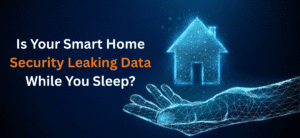Smart homes are no longer a futuristic concept. They’ve become an everyday reality, transforming how we live, work, and interact with our surroundings. From voice-activated assistants and app-controlled lighting to smart thermostats and connected doorbells, technology has made daily life easier and more efficient.
But as homes get smarter, smart home security becomes more critical than ever. Every connected device, while designed to simplify life, is also a potential gateway for data leaks and cyber threats. The most concerning part? Many of these risks occur silently, without you even realizing it sometimes while you sleep.
In this blog, we’ll uncover how your smart home might be leaking data, why it matters, and most importantly, what steps you can take to strengthen your smart home security.
The Rise of the Smart Home
The global smart home market is booming. According to Statista, over 400 million smart homes are expected worldwide by 2025. Consumers love the convenience of controlling lights, appliances, and security systems with a voice command or a tap on their smartphones.
However, this convenience comes at a cost: data. Every smart device generates, stores, and transmits information. That means your habits, routines, and preferences are continuously recorded. Without robust smart home security, you may unknowingly be giving away more than you bargained for.

The Invisible Smart Home Security Leak
Most homeowners believe devices only “work” when they’re actively in use. But in reality, many gadgets constantly communicate with cloud servers, apps, or third-party services in the background. This is where smart home security issues begin.
Take these examples:
-
Voice Assistants – Amazon Alexa, Google Assistant, or Siri may pick up unintended voice snippets, sending them to servers for analysis.
-
Smart TVs – Even when turned “off,” some TVs still ping servers, reporting viewing habits, app use, and more.
-
Smart Thermostats – These devices learn your routine, such as when you’re home or away. While useful, such data can reveal too much about your lifestyle if leaked.
-
Security Cameras and Doorbells – These continuously stream or store footage, raising questions about who can access recordings.
Without strong smart home security, this constant background communication becomes a silent leak of personal information.
What Does “Leaking Data” Really Mean?
When discussing smart home security, “leaking data” refers to devices transmitting more information than is necessary or sharing it with third parties without explicit consent.
Types of leaked data often include:
-
Device usage logs
-
Location data
-
Voice recordings or snippets
-
App interactions
-
Network behavior patterns
Even if anonymized, this data helps create a detailed profile of your household. Advertisers, data brokers, or even hackers can use it to understand your daily routine, preferences, and vulnerabilities.
Why Smart Home Security Should Concern You
At first glance, a lightbulb sending a status ping might not sound like a big deal. But when combined with data from multiple devices, the bigger picture emerges and it’s alarming. Weak smart home security can lead to:
1. Security Risks
Hackers exploit leaked data to target vulnerabilities. If they know when you’re away, your home becomes more vulnerable to physical break-ins.
2. Targeted Ads
Companies use data to deliver hyper-personalized ads. While not always harmful, it can feel invasive.
3. Behavior Profiling
Data reveals routines when you wake up, leave home, or go on vacation. This profiling can be used to manipulate decisions.
4. Loss of Control
Most homeowners don’t know how long companies store their data or who has access. This lack of transparency undermines trust.
These risks highlight why smart home security isn’t optional. it’s essential.
Signs Your Smart Home Is Leaking Data
Detecting data leaks can be tricky, but here are some red flags that suggest weak smart home security:
-
Sudden spikes in data usage at odd times (like 2 AM).
-
Devices lighting up, making noises, or showing activity when not in use.
-
Suspicious IP addresses in your router logs.
-
Ads that feel “too specific,” reflecting private conversations or activities.
If you spot these signs, your smart home security setup may already be compromised.
5 Smart Home Security Tips to Stop Data Leaks
The good news? You don’t have to give up your smart home devices. Instead, you need a strategy to improve smart home security. Here are five essential steps:
1. Use Network Monitoring Tools
Install router apps or third-party tools to monitor network traffic. You’ll see which devices are sending data, when, and to where. This is your first line of defense in smart home security.
2. Disable Unused Features
If you don’t use voice commands, turn off the microphone. Don’t need location tracking? Disable it. Each unnecessary feature is a potential data leak.
3. Create a Separate Wi-Fi Network
Segregate smart devices from personal devices like laptops and phones. This network segmentation limits exposure and strengthens your smart home security perimeter.
4. Keep Firmware Updated
Outdated software is a hacker’s best friend. Regularly update your devices to close security loopholes. Most smart home security breaches happen because of neglected updates.
5. Choose Privacy-Focused Devices
Not all brands treat privacy equally. Select devices from manufacturers with strong reputations for smart home security, transparent policies, and local data storage options.
The Bigger Picture: Smart Home Security and Cybercrime
Cybercrime is on the rise, and smart homes are prime targets. A 2023 report by Cybersecurity Ventures predicted global cybercrime costs will reach $10.5 trillion annually by 2025. Many of these attacks exploit weak points in IoT (Internet of Things) devices.
Smart homes, filled with IoT gadgets, are essentially mini networks. Without robust smart home security, each device becomes a potential entry point for attackers. From ransomware to identity theft, the risks are real and growing.

Beyond Devices: Network-Level Smart Home Security
While securing individual devices is critical, smart home security works best at the network level. Consider these advanced steps:
-
Install a Firewall – Protects against unauthorized traffic.
-
Use a VPN Router – Encrypts all data leaving your home network.
-
Enable WPA3 Encryption – Stronger Wi-Fi encryption standards prevent unauthorized access.
-
Regular Security Audits – Periodically check for vulnerabilities.
By fortifying your home network, you create an additional shield for your devices.
The Role of Regulations in Smart Home Security
Governments are beginning to recognize the risks of connected devices. For instance:
-
The EU’s GDPR enforces strict rules on data privacy.
-
The U.S. IoT Cybersecurity Improvement Act sets minimum security requirements for connected devices.
While these laws help, ultimate responsibility for smart home security still rests with homeowners. Awareness and proactive measures are your best protection.
The Future of Smart Home Security
Looking ahead, smart home security will evolve alongside technology. Trends to watch include:
-
AI-powered Monitoring – Smarter detection of suspicious activity.
-
Decentralized Data Storage – Less reliance on cloud providers.
-
5G and Edge Computing – Faster networks may also create new vulnerabilities.
-
Green Security Solutions – Eco-friendly devices designed with both efficiency and privacy in mind.
Investing in smart home security today prepares you for tomorrow’s challenges.
Conclusion: Protect Your Home, Protect Your Privacy
Smart homes are here to stay. They make life easier, safer, and more connected. But without strong smart home security, the same devices that simplify your life can put your privacy at risk.
From voice assistants and thermostats to cameras and TVs, your devices could be leaking data while you sleep. The solution isn’t abandoning technology it’s taking control of it.
By adopting best practices, monitoring networks, and choosing privacy-first brands, you can enjoy the benefits of a smart home without compromising your data.
At vGics Global, we specialize in helping homeowners strengthen smart home security. Because a truly smart home isn’t just connected. it’s protected.





















